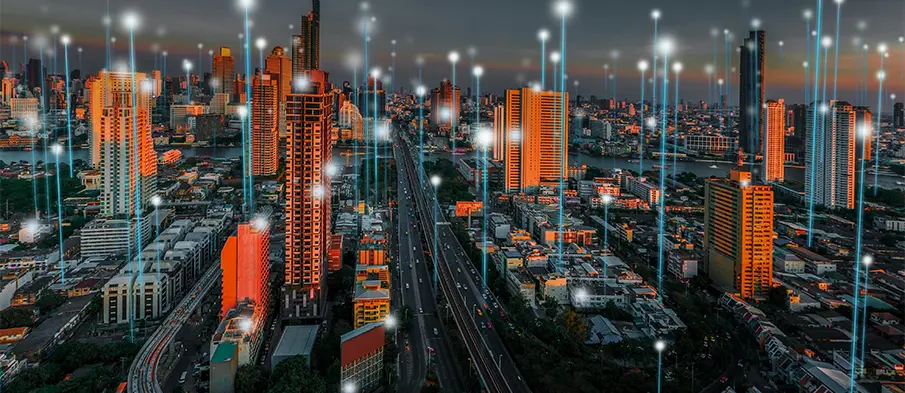
In a recent “National conference on cyber security of smart cities” the Union Home Secretary Govind Mohan emphasized on mandatory CISOs appointment in all smart cities, this acknowledges a fundamental truth: as cities become increasingly digitized and interconnected, they simultaneously become more vulnerable to cyber threats that can paralyze critical infrastructure and compromise citizen data.
The Critical Need for CISOs in Smart Cities
The appointment of CISOs in smart cities is not merely a bureaucratic requirement, it is an essential strategic necessity. Smart cities in India are equipped with complex infrastructure including assured water and power supply systems, sanitation and waste management, efficient urban mobility, robust IT connectivity, and citizen safety mechanisms. All these systems generate and process enormous amounts of sensitive citizen data, making them attractive targets for cybercriminals.
Unique Responsibilities of Smart City CISOs
Being a CISO for a smart city differs significantly from serving in an enterprise role. Smart city CISOs must own all matters related to cyber and information security, risk management, and compliance while aligning their strategy with the primary objectives of smart city development. They face the complex task of securing interconnected systems that span multiple domains—from traffic management to energy distribution to emergency services.
The scope of responsibilities includes overseeing cybersecurity measures across multiple government tiers, with smart cities typically involving three key governing stakeholders: the Central Government, State Government, and local city administration. This multi-layered governance structure presents unique coordination challenges that enterprise CISOs rarely encounter.
India’s Cybersecurity Skill Gap Crisis
India faces a severe cybersecurity talent shortage that directly impacts smart city implementation. The country needs approximately 1.5 million cybersecurity professionals to bridge the current gap. Studies indicate that 92% of Indian organizations experienced breaches in the past year, with many attributing these incidents to the shortage of qualified cybersecurity professionals.
The financial impact is staggering: 66% of Indian companies reported losses exceeding USD 1 million from cyberattacks in 2024, up from 43% the previous year. Additionally, 82% of executives in India faced severe penalties, including job loss, due to breaches, highlighting the critical need for qualified CISOs who can prevent such incidents.
Key Factors Contributing to the Skills Gap
Several factors compound India’s cybersecurity talent shortage:
- Limited academic focus: Cybersecurity training in academia is not keeping pace with the evolving threat landscape
- Experience barriers: Freshers face difficulty entering cybersecurity roles, with companies typically requiring minimum three years of experience
- Rapid technological advancement: The constant evolution of cyber threats outpaces existing training programs
- Industry-specific training gaps: Many cybersecurity professionals lack hands-on, industry-specific training needed for complex environments like smart cities
India’s cybersecurity workforce stood at around 0.3 million in 2023, up from 0.21 million in 2022 and 0.1 million in 2021, indicating growth but still falling far short of demand.
Implementation Challenges and Complexities
Governance and Multi-Stakeholder Coordination
Smart city CISOs face unprecedented governance challenges. They must navigate complex three-tier government structures while implementing security frameworks across diverse urban systems. The involvement of multiple stakeholders—including Smart City Special Purpose Vehicles (SPVs), Project Management Consultants (PMCs), Master System Integrators (MSIs), Original Equipment Manufacturers (OEMs), and third-party vendors—creates coordination complexities that can undermine security efforts.
Technology Integration Challenges
Smart cities integrate 10 to 12 advanced technologies including IoT sensors, AI surveillance, smart lighting, traffic management systems, and real-time analytics platforms. Achieving interoperability among these diverse systems while maintaining security standards presents significant technical hurdles. CISOs must ensure that security measures don’t compromise system functionality or user experience.
Risk Management in Complex Environments
Risk management in smart cities involves securing systems where “it’s all about the grey—it is never black and white. Smart city CISOs must assess risks on projects involving cutting-edge technologies with limited precedent for understanding associated security risks. The interdependencies between smart city technologies create potential cascade effects, where failures in one system can trigger widespread disruptions.
Budget and Resource Constraints
Many Indian smart cities face limited budget allocation for cybersecurity in their overall smart city budgets. Even when budgets are allocated, they often don’t match the risk profile of smart cities, making it difficult to establish adequate defenses. CISOs must work within these constraints while ensuring comprehensive security coverage.
Capacity Building and Scalability
Indian cities experience rapid growth due to influx from rural areas, requiring technology components to be ready to scale up and manage capacity problems. CISOs must plan for this growth by creating comprehensive master plans, using data more effectively, and developing sustainable funding strategies.
Essential CISO Capabilities for Smart Cities
Technical Expertise Requirements
Smart city CISOs need expertise across multiple domains:
- IoT security: Managing security for millions of connected devices
- Cloud computing security: 50% of organizations report skill gaps in this area
- Network security: Understanding complex interconnected urban systems
- Risk assessment: Conducting business-driven risk assessments for diverse city services
- Incident response: Managing cybersecurity incidents that could affect critical city services
Leadership and Communication Skills
Beyond technical expertise, smart city CISOs require strong soft skills including problem-solving, communication, teamwork, and collaboration. They must work with stakeholders across diverse departments—from City Treasurer’s Office to Police Department to Public Utilities—each with unique business requirements and workflows6.
Addressing Implementation Challenges
Building Security-First Culture
CISOs must champion a security-first approach throughout smart city development. This includes ensuring cybersecurity requirements are considered in Project Management Consultant (PMC) and Master System Integrator (MSI) selection processes, and that security is included as an agenda item in all project status meetings.
Stakeholder Engagement and Education
A critical challenge is getting key city administration stakeholders to become information security aware, enabling them to participate effectively in decision-making processes. CISOs must serve as educators and advisors, helping departments understand security implications of new technologies while supporting their business objectives.
Continuous Monitoring and Assessment
Smart cities require robust security assessment mechanisms. CISOs must establish regular security audits—internal audits at least every six months and third-party security audits annually. They must also maintain contact with security agencies such as CERT-In and NCIIPC for cyber threat advisory and incident reporting.
The Path Forward
The mandate for CISO appointments in every Indian city represents recognition of cybersecurity as a fundamental requirement for smart city success. However, successful implementation requires addressing the underlying skills gap through comprehensive training programs, academic partnerships, and innovative recruitment strategies.
Organizations are expanding their search beyond domestic talent, tapping into diverse international markets, while simultaneously investing in skilling initiatives through partnerships with educational institutions and industry certifications. The surge in cybersecurity certification programs, with over 400 institutions involved, reflects concerted efforts to build local talent and meet growing demand.
As India’s smart city market continues growing at over 30% CAGR and reaching $6.06 billion in 2023, the importance of qualified CISOs cannot be overstated. These professionals serve as the guardians of urban digital infrastructure, ensuring that the promise of smart cities—enhanced citizen services, improved efficiency, and better quality of life—can be realized safely and securely.
The mandate for CISO appointments is not just about compliance; it’s about building cyber-resilient cities that can withstand the evolving threat landscape while serving as models for sustainable urban development in the digital age.






